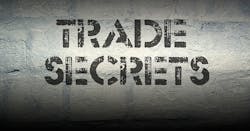Hitachi Metals Claims Chinese Companies Stole Trade Secrets
Hitachi Metals Ltd. filed a complaint with a U.S. trade commission Tuesday, claiming Chinese manufacturers stole secret processes for making amorphous metal ribbon that’s lighter and stronger than traditional steel.
China’s Advanced Technology & Materials Co. and related companies ramped up production of the metal thanks to secret manufacturing processes stolen by a retired Hitachi Metals employee and his assistant, Hitachi Metals and its Metglas unit said in a complaint lodged with the U.S. International Trade Commission in Washington. They are asking that imports of all China-made versions of the product be halted at the U.S. border.
The amorphous metal ribbons are an alloy with glass-like qualities. Because it has high strength and improved magnetic abilities, it’s used in medical devices in place of titanium, to create stealth vehicles, and for high-efficiency transformers.
“In order to protect our advanced technologies as a source of global competitiveness for Hitachi Metals, we will continue to take decisive action against unfair competition in the future,” the Tokyo-based company said Wednesday in a statement.
No one at the Beijing office of Advanced Technology & Materials was immediately available for comment. China’s Ministry of Commerce didn’t immediately respond to a faxed request for comment.
The Chinese companies have begun to enter the U.S. amorphous steel market with imports designed for the electricity grid, which is taking away Metglas business, according to Hitachi Metals’ complaint, which bought South Carolina-based Metglas from Honeywell International Inc. in 2003.
The theft of the trade secrets could “destroy or substantially" injure the U.S. industry, Hitachi Metals said in the complaint. “Metglas has had to reduce production capacity and head count to cope with the theft.”
The issue comes as the Trump administration investigates China’s intellectual property practices and allegations it’s has been stealing trade secrets from American firms. The U.S. Trade Representative’s office last month opened the investigation under authority granted by Section 301 of the 1974 Trade Act, which allows the president to impose tariffs and quotas on foreign goods to protect American companies from unfair trading practices.
The bipartisan Commission on the Theft of American Intellectual Property estimates that intellectual-property violations cost the U.S. economy as much as $600 billion a year, with China standing out as the top culprit.
China’s amorphous metal ribbon production “has experienced an exponential growth in manufacturing capacity” that can only be the result of information given by the two retired employees, Hitachi Metals said in its complaint.
The company said it learned of the production growth after AT&M filed a complaint with the Chinese Ministry of Commerce, accusing Hitachi Metals of dumping the product at cheap prices there. Hitachi Metals contends it was able to dominate the global market because others couldn’t figure out its secret production process.
The commission will consider the complaint and decide within a month whether to investigate the claims. It typically completes such investigations in about 15 to 18 months.
By Susan Decker
About the Author
Bloomberg
Licensed content from Bloomberg, copyright 2016.
